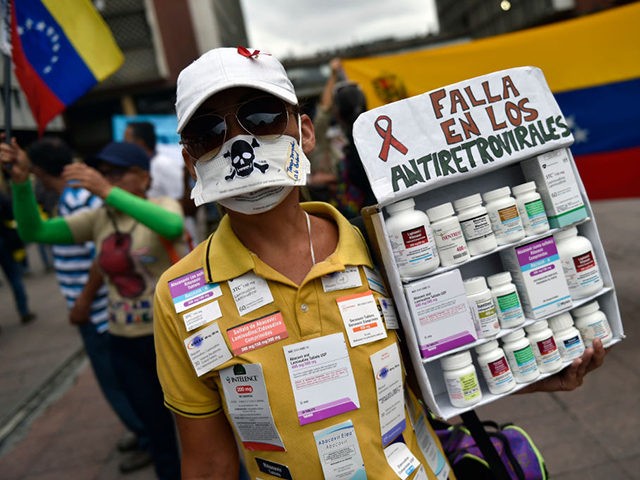Congress included on Monday $400 million in humanitarian funding for Venezuela in a mandatory appropriations bill to keep the government running.
An amended version of the VERDAD act, first proposed by Sen. Bob Menendez (D-NJ) and Sen. Marco Rubio (R-FL) this year, will authorize $200 million in assistance for addressing Venezuela’s internal humanitarian crisis, as well as a further $200 million to help countries dealing with the rising flow of migrants entering their country.
It is not immediately clear if the money will be given to the government of President Juan Guaidó, which has twice faced allegations of corruption and misappropriation of funds. Guaidó is legitimately Venezuela’s head of state but has failed to exercise his powers as dictator Nicolás Maduro refuses to vacate the presidential palace and remains in control of the army. Maduro is a “Bolivarian socialist,” while Guaidó belongs to a political party that is a full member of the Socialist International.
A spokesperson for Sen. Rubio told Breitbart News that the State Department will soon “come up with a plan in coordination with USAID” to distribute the humanitarian aid funds, but did not provide further details.
Other parts of the amended act include the continued recognization of Guaidó’s legitimacy and the targeting of the billions in private assets stolen by Maduro’s socialist regime. It also seeks to make sanction exceptions for regime officials who have disavowed Maduro and recognized Guaidó as president.
The act also requires that President Donald Trump, who has repeatedly spoken of his desire to see Maduro leave power, start working with the International Monetary Fund and Multilateral Development Banks to “advance planning for the economic reconstruction of Venezuela,” with the country currently experiencing the highest rate of inflation in the world.
More details include a call for the U.S. to maintain its support for the efforts of the Organization of American States (OAS) and the Lima Group, a coalition of Latin American countries opposed to Maduro, and authorizing $3 million to “coordinate international sanctions and build the capacity of Latin American and Caribbean governments to carry out targeted sanctions.”
Included in funding bill which will pass this week is our #VerdadAct which:
-guarantees sanctions will be lifted for those who support democracy & not guilty of human rights violations
-provides millions in humanitarian aid to people of #Venezuelahttps://t.co/5klYFKQFRA
— Marco Rubio (@marcorubio) December 17, 2019
The National Assembly, Venezuela’s federal legislature, swore Guaidó in as president in January after Maduro’s last legal presidential term expired. Maduro has refused to acknowledge this and remains in control of the country. After rigging last year’s presidential elections, Maduro’s inauguration ceremony in January sparked the action from the National Assembly.
In a statement to the Miami Herald, Rubio said the approval of the act in the latest appropriations compromise “reaffirms our nation’s unwavering support to interim President Juan Guaidó, and the democratically elected National Assembly.”
Menendez wrote on Twitter that it was America’s “single largest legislative response” to the Venezuela crisis, reaffirming support for Guaidó and increasing strategic pressure on the socialist regime.
The single largest legislative response to #Venezuela’s crisis, the VERDAD Act reaffirms U.S. support for the Venezuelan people and Interim-President Juan Guaidó and expands strategic pressure on the Maduro regime.
— Senator Bob Menendez (@SenatorMenendez) December 16, 2019
The revised version of the act received bipartisan support, with Sens. Dick Durbin (D-IL), Ted Cruz (R-TX), Ben Cardin (D-MD), John Cornyn (R-TX), Tim Kaine (D-VA), Todd Young (R-IN), Jeanne Shaheen (D-NH), Lindsey Graham (R-SC), Michael Bennet (D-CO), John Barrasso (R-WY), Chris Coons (D-DE), Bill Cassidy, M.D. (R-LA), Josh Hawley (R-MO), Kirsten Gillibrand (D-NY), Tom Carper (D-DE), and Cory Gardner (R-CO) all co-sponsoring the legislation.
The end of 2019 marks another year in which the Venezuelan opposition proved unable to overthrow Maduro, who has ruled by decree since seizing power following the death of his revolutionary predecessor Hugo Chávez. The country’s predicament has plunged to new depths this year, with a recent study by the Brookings Institute warning that rate of outward migration will soon surpass that of war-torn Syria.
Following his own inauguration ceremony and worldwide recognition of his position, Guaidó energized the country’s opposition into believing that they could overthrow Maduro. However, his failure to persuade senior military leaders to change allegiance and refusal to demand any outside intervention has made any seizure of power unattainable so far.
Follow Ben Kew on Facebook, Twitter at @ben_kew, or email him at bkew@breitbart.com.

COMMENTS
Please let us know if you're having issues with commenting.